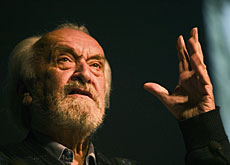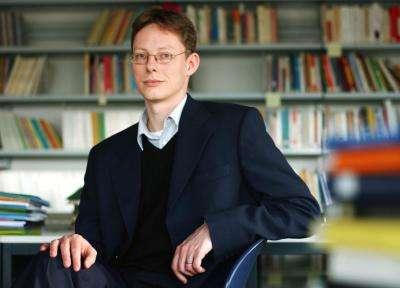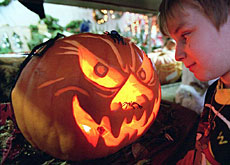Why we celebrate letting the sunshine in

Swiss author and myth expert Sergius Golowin tells swissinfo how even if Easter traditions were forgotten, people would probably rediscover them.
Even before Christian superstitions, Golowin says Easter had always symbolised the birth and resurrection of Nature after the long winter months.
swissinfo: Some people like to decorate their homes at Easter with eggs and branches and other things. Is this a recent tradition?
Sergius Golowin: You can’t really tell from historical sources. But even if we no longer knew pre-Christian and Christian traditions, we would probably still end up celebrating Easter. Easter is a time of green shoots and growth, of blooming flowers and resurrection.
Easter is innate, almost instinctive. We probably can’t help but be happy about the arrival of spring, with the return of sunshine and light.
swissinfo: The roots of an Easter-time festival predate Christianity. So what are people actually celebrating?
S.G.: Resurrection time is the proof that you have survived the cold and dark winter. People showed their pleasure by picking the first flowers and twigs.
Eggs, an important foodstuff at the time, were also given out. They were often painted red, the colour of fire, the Sun and the dawn sky.
The rabbit that brought the eggs was the symbol of fertility, since rabbits have plenty of offspring. In books interpreting dreams, it is said that a person who dreams of eggs or rabbits at Easter time will be happy. And someone who sees a rabbit at dawn over Easter will stay healthy and have a good year.
swissinfo: Did pre-Christian feast days reflect the time of the year?
S.G.: Yes, people had to live according to the seasons. Life and work were part of a cycle.
In spring, life began anew, people started to work to ensure survival and enjoyment grew. By mid-summer, everything was at its peak. In autumn, Nature started to shut down before the long winter stretch.
swissinfo: People no longer live according to the seasons. Are feast days now driven by consumerism and the desire to escape everyday life?
S.G.: It’s obvious that sales of Easter eggs and bunnies are driven by chocolate consumption. But they do remind us of the reasons for celebrating it and the traditions of our forebears. Eating and drinking have always played a role there.
For example there is the tradition of heading in silence to a fountain or a spring before dawn on Easter Sunday to drink water that will keep you healthy and happy. This old tradition has enjoyed a recent resurgence.
swissinfo: Christianity links Easter to the story of Jesus – Christians believe he was crucified on Good Friday only to rise from the dead on Easter Sunday. What does Easter mean in Christian churches?
S.G.: Christians believe, just as others did before Jesus’s time, in the resurrection of Nature, with the help of God. People can see with their own eyes that God keeps his promise that everything will come back to life.
swissinfo: So the churches haven’t taken over Easter for themselves?
S.G.: Not really. The Eastern churches don’t use the imagery of Christ on the cross but of Christ having risen from the dead surrounded by light, who gives the faithful happiness, salvation and redemption.
swissinfo: Children hunting for eggs is a typical image of Easter. Was this always the case?
S.G.: Probably. In earlier times children could hardly leave the home in winter because they weren’t strong enough to face the cold and snow – and there was no skiing or sledding.
With the return of sunshine in spring, you want to go outside, perhaps go up a hill and greet the new year.
swissinfo: So is Easter Sunday the most lively feast day of the year?
S.G.: Yes. If Easter loses its significance, it’s because we are too civilised. If you look deep into the human soul, you can see that chocolate eggs have the same significance as the lovingly painted eggs of the old tradition.
swissinfo-interview: Renat Künzi
Christians and Pagans have celebrated death and resurrection themes following the spring equinox for millennia.
Most religious historians believe many elements of the Christian observance of Easter were derived from earlier Pagan celebrations.
In most Christian societies, the holiday’s name is derived from Pesach, the Hebrew name of Passover, a Jewish holiday to which the Christian Easter is closely linked.
The English and German names, Easter and Ostern, are related to ancient names for the month of April, Eostremonat and Ostaramanoth respectively.
Sergius Golowin was born in Prague in 1930.
Golowin, who lives in Bern, is a librarian, folklorist, myth expert, politician and author.
In 1974 he received the Swiss Schiller Foundation’s annual prize for his services to folklore and marginal cultural practices.
During the 1950s and 1960s Golowin was one of the leaders of the so-called non-conformist movement in Switzerland.

In compliance with the JTI standards
More: SWI swissinfo.ch certified by the Journalism Trust Initiative



You can find an overview of ongoing debates with our journalists here . Please join us!
If you want to start a conversation about a topic raised in this article or want to report factual errors, email us at english@swissinfo.ch.